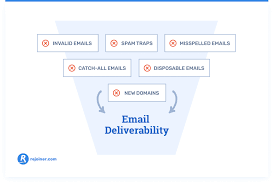Blog Content as HTML:
Blog Title: Email Validation: Unlocking the Power of Deliverability and Data Quality
Meta Title: Discover the Importance and Benefits of Email Validation for Data Quality and Deliverability
Meta Description: Dive into the world of email validation, explore its significance in maintaining clean data, improving deliverability, and maximizing email marketing success. Get answers to common questions and gain insights into how this process works.
Email Validation: Unlocking the Power of Deliverability and Data Quality
In an era dominated by digital communication, email remains a cornerstone of personal and business interactions. Whether you're sending a marketing campaign, an important update, or a simple message, ensuring that your emails reach their intended recipients is crucial. But how do you guarantee that the email addresses in your database are accurate and valid? The answer lies in email validation.
In this comprehensive guide, we'll delve into the world of email validation, its importance, the benefits it offers, and how it can significantly enhance your email marketing campaigns. Whether you're a seasoned marketer or just starting, understanding and implementing email validation can make a profound impact on your email deliverability and data quality.
Understanding Email Validation
What Is Email Validation?
Email validation is a systematic process of verifying the accuracy and legitimacy of email addresses. It involves a series of checks to ensure that an email address is both properly formatted and connected to an active mailbox. The primary goal is to identify and filter out invalid, disposable, or temporary email addresses, reducing the likelihood of bounced emails and spam complaints.
Why Is Email Validation Important?
Email validation serves a dual purpose: it enhances data quality and boosts email deliverability. Let's explore these aspects in more detail:
1. Data Quality Improvement
Reduces Fake or Invalid Entries: Invalid or fake email addresses can clutter your database, skewing your understanding of your audience and affecting the accuracy of your reports and analytics.
Enhances Customer Insights: Clean data provides more accurate insights into your audience's behavior and preferences, enabling you to tailor your messaging effectively.
2. Enhanced Email Deliverability
Minimizes Bounce Rates: Validating email addresses reduces hard and soft bounce rates, ensuring your emails reach the inbox and don't harm your sender reputation.
Reduces Spam Complaints: High bounce rates and spam complaints can negatively impact your sender score. Email validation helps maintain a positive sender reputation.
The Benefits of Email Validation
1. Improved Sender Reputation
A good sender reputation is crucial for email marketers. Internet Service Providers (ISPs) and email service providers (ESPs) evaluate sender reputation to determine whether an email should be delivered to the inbox, spam folder, or rejected. Email validation minimizes bounce rates and spam complaints, safeguarding your sender reputation.
2. Enhanced Deliverability
Deliverability is the holy grail of email marketing. Validating email addresses ensures that your messages reach the inbox, increasing the chances of your recipients reading and engaging with your content.
3. Cost Savings
Sending emails to invalid or non-existent addresses is not only wasteful but also costly. By weeding out invalid addresses through validation, you save money on email campaigns and resources.
4. Accurate Customer Insights
Clean data leads to accurate customer insights, allowing you to make data-driven decisions and personalize your campaigns effectively. Knowing your audience better can result in higher engagement and conversions.
How Does Email Validation Work?
Email validation relies on a combination of techniques and checks to verify the authenticity of an email address. Here's an overview of the typical validation process:
1. Syntax Check
The validation process begins with a syntax check to ensure the email address conforms to the standard format (e.g., [email protected]). This step identifies obvious errors like missing "@" symbols or extra spaces.
2. Domain Check
The system checks the domain of the email address (e.g., example.com) to ensure it exists, is properly configured, and can receive emails. Invalid or nonexistent domains are flagged.
3. MX Record Check
An MX (Mail Exchange) record check verifies that the domain has the necessary mail server infrastructure to accept emails. Without an MX record, an email cannot be delivered.
4. Disposable Email Address Check
Disposable email addresses, often used for temporary purposes or spam, are typically excluded from marketing campaigns. Email validation identifies and filters out such addresses.
5. Role-Based Email Check
Role-based email addresses (e.g., [email protected], [email protected]) are often monitored by multiple people. These addresses are flagged during validation, as they can lead to lower engagement.
6. SMTP Verification
The final step involves a real-time interaction with the recipient's mail server to check if the email address is deliverable. This process, known as SMTP verification, is the most accurate method of validation.
Frequently Asked Questions (FAQs)
1. How often should I validate my email list?
The frequency of validation depends on how you collect and manage email addresses. Regular validation during data entry and periodic batch validation are recommended.
2. Can email validation prevent all bounces?
While email validation significantly reduces bounce rates, some issues may only become apparent during delivery attempts. Therefore, it's essential to combine validation with other best practices.
3. Is email validation suitable for international addresses?
Yes, reputable email validation services support international email addresses, ensuring global reach for your campaigns.
4. Can email validation check catch-all domains?
Yes, some email validation tools can identify catch-all domains, which accept emails sent to any address at that domain.
5. What's the return on investment (ROI) of email validation?
The ROI can be substantial, as you save on email marketing costs and potentially increase revenue through better deliverability and open rates.
Conclusion
In the



